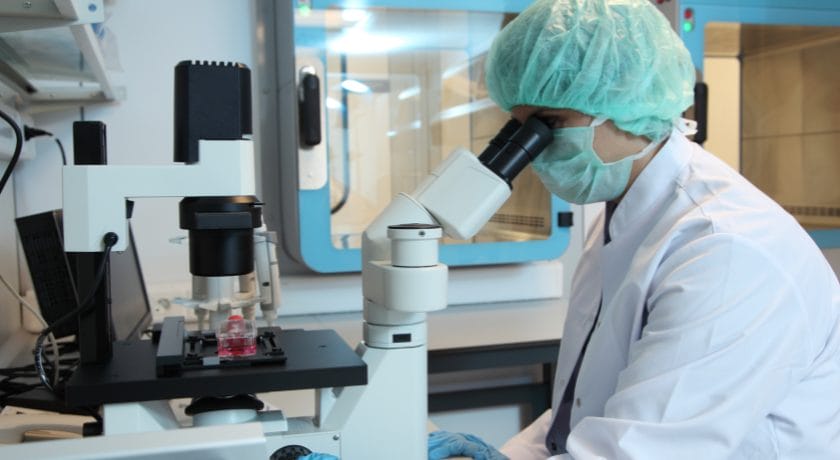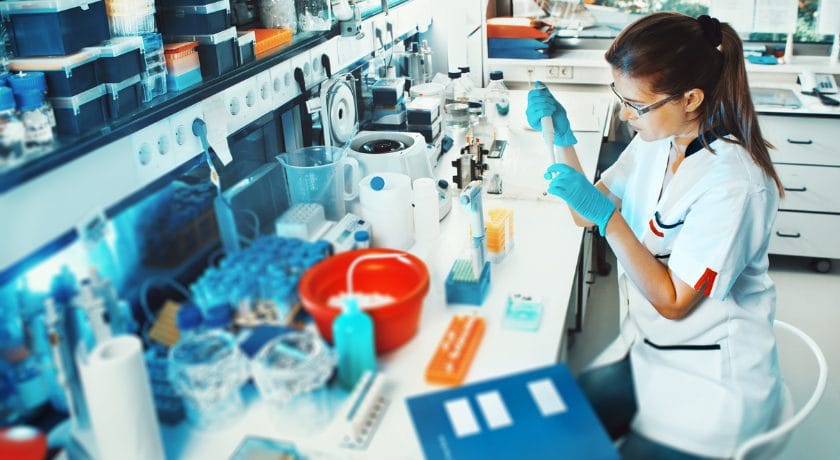What Is Laboratory Data Management?

While laboratories generate a plethora of information, data doesn’t have to be disorganized if you have the right tools in place.
This is where laboratory data management becomes indispensable.
But what is laboratory data management, and what does it entail?
In this article, we’ll explain all you need to know about laboratory data management, including its key benefits and best practices, and how our ELN Archiving solution at ZONTAL can help.
Centralize and protect your data with ZONTAL.
What Is Laboratory Data Management?
Laboratory data management is the process of systematically handling and organizing data in a laboratory or research facility.
Laboratory data management encompasses automation of data collection, storage, quality control, metadata, validation, metrics and decision-making.
Key Benefits of Maintaining Quality Data in the Laboratory
Effective lab data management is paramount for life science laboratories to ensure data is accurate, reliable and accessible. Key benefits include:
1. Boost the Reliability of Results
Quality data ensures that the results you obtain are reliable and reproducible, minimizing errors and variability in experimental outcomes.
This reliability is essential for validating hypotheses and making informed decisions based on the data.
2. Improve Decision-Making
High-quality data provides a solid foundation for decision-making.
Whether it’s for clinical diagnostics, pharmaceutical research or environmental testing, accurate data allows for better-informed decisions that can lead to effective interventions and innovations.
3. Regulatory Compliance
Laboratories must adhere to strict regulatory standards set by governmental and international bodies to ensure the safety, accuracy of testing procedures and integrity of results.
In addition, adhering to these standards fulfills a legal obligation and plays a key role in maintaining public trust.
For example, the FDA enforces specific regulations, which include guidelines for Good Laboratory Practices (GLP) and Good Manufacturing Practices (GMP).
4. Improve Safety
In pharmaceuticals and chemical manufacturing, the safety of products can directly depend on the quality of laboratory data.
Accurate data ensures that only safe and effective products reach the market, protecting public health.
For example, when developing a drug, precise measurements of compound concentrations are essential for determining the correct dosage that is both effective and safe for consumers.
Any errors can lead to ineffective or harmful products, underlining the importance of rigorous laboratory practices and data validation.
5. Facilitate Innovation
Quality data is crucial for advancing scientific knowledge. Accurate and reliable data contribute to meaningful insights and breakthroughs, driving innovation across various fields.
6. Long-term Data Utilization
High-quality data is valuable for future research and analysis.
In addition, well-maintained and accurate data can be significantly useful for longitudinal studies and meta-analyses, adding long-term value beyond the original experiments.

10 Best Laboratory Practices to Ensure Quality Data
When you adhere to best practices in the laboratory, you can maintain data quality, accuracy and credibility, while ensuring compliance with industry standards and regulations.
From establishing SOPs to obtaining calibration certificates, here are ten best practices when maintaining quality data in the laboratory.
1. Develop Comprehensive Standard Operating Procedures (SOPs)
Standard operating procedures (SOPs) are a set of directives that make sure laboratory processes and experiments are performed safely and effectively.
SOPs improve efficiency, ensure consistent quality, reduce errors and minimize regulatory non-compliance by improving communication.
Document all laboratory procedures with step-by-step instructions that are easy to follow.
For example, when recording the procedure for a titration experiment, include detailed descriptions of each chemical used, specify the exact measurements, and provide clear directions on the handling and mixing processes.
Then, regularly review and update the SOPs to reflect any changes in technology, equipment or methodology.
2. Implement Good Laboratory Practices (GLPs)
Good Laboratory Practices (GLPs) are principles that guide the planning, conducting, monitoring, recording and reporting of laboratory studies.
When your facility adheres to GLPs, you ensure the data you generate is transparent, credible and traceable. This includes documenting procedures, maintaining records and complying with industry regulations.
3. Prioritize Quality Assurance
Quality assurance (QA) ensures accurate and reliable test results by involving activities inside and outside the laboratory.
To ensure quality assurance, implement specific laboratory practices such as regular calibration of equipment, thorough documentation of experiments and systematic staff training.
In addition, use control samples and standard references to monitor the accuracy and precision of laboratory tests.
4. Perform Routine Calibration
Regularly fine-tuning your equipment can help guarantee accuracy and precision in measurements.
Different instruments require different calibration methods, and following these methods ensures accuracy and traceability.
For example, you might calibrate a digital thermometer using a precise temperature bath, while you could adjust a pressure gauge against a master gauge known for its exactness.
Meticulously following each type of instrument’s specific standards and processes can help maintain reliable performance.

5. Acquire Certifications and Calibration Certificates
Ensure you obtain and maintain certifications and calibration certificates to uphold best laboratory practices and maintain quality data.
Secure ISO accreditation, such as ISO 17025, to guarantee the accuracy and reliability of your testing and calibration results.
In addition, keep all calibration certificates for your instruments current to guarantee their accuracy and reliability.
6. Secure Your Data
Implement secure storage solutions that protect the integrity of your data and prevent unauthorized access or data loss.
Consistently back up all critical data to multiple secure locations to protect against accidental loss or system failures.
7. Control Environmental Conditions
Regularly monitor and regulate temperature, humidity and cleanliness within the laboratory to meet the requirements of each experiment.
Install high-quality HVAC systems to maintain consistent temperature and humidity levels and use HEPA filters to keep the air clean.
8. Manage Incidents
Encourage transparent reporting and documentation of errors to learn from mistakes and prevent future occurrences.
Implement a clear policy that requires all lab personnel to promptly record any deviations or errors in experiments.
Analyze these reports to identify patterns and root causes, leading to effective corrective actions that improve the integrity of your data.
9. Provide Training
Conduct regular training sessions for all your employees to ensure they are proficient in the latest data handling techniques and compliance standards.
Focus on topics such as proper data entry, use of data management software and data security protocols.
10. Practice Continuous Improvement
Establish mechanisms for feedback on laboratory processes and safety. Conduct regular audits and reviews of laboratory procedures, safety compliance, and data integrity.
For example, you can set weekly or monthly meetings where staff can discuss lab processes and safety openly.
These meetings can lead to discussions about recent near-miss incidents, such as a chemical spill that was narrowly avoided, prompting a review of handling protocols.
Manage your data with ZONTAL.
What Is an Electronic Lab Notebook (ELN)?
An electric lab notebook (ELN) is a digital tool designed to replace traditional paper notebooks, allowing researchers to record experiments more efficiently and manage data more securely.
It is an invaluable tool for pharmaceutical and life science organizations, as it stores data and intellectual property that drive product development and commercialization.
How Does an ELN Relate to Laboratory Data Management?
An ELN is integral to laboratory data management, streamlining the documentation, retrieval, and sharing of experimental data.
It ensures that information is organized and accessible, improving research collaboration and compliance.
- Data Organization and Retrieval: ELNs can help systematic recording of experimental procedures, observations, results and conclusions. Effective data management practices ensure that this data is organized, indexed, and archived in a way that makes it easily retrievable for future reference or audits.
- Data Integrity and Security: ELNs can store a large volume of sensitive and critical scientific data and ensure information can’t be changed or lost. Archiving as part of data management involves maintaining records in a secure, unalterable state for long-term storage.
- Compliance and Standards: Laboratories are often subject to regulatory requirements, such as those from the FDA or EMA, which mandate detailed record-keeping and data integrity. Proper ELN archiving within a secure data management framework ensures compliance with these regulations, facilitating audits and inspections.
- Collaboration and Sharing: ELNs often facilitate collaboration among researchers by allowing them to share data and notes easily. Data management practices ensure this shared data is organized and secure, which improves the integrity of research findings.
- Efficiency and Productivity: Integrating ELN archiving with laboratory data management systems can streamline workflows, reduce the duplication of data entry and minimize errors. This integration enhances overall laboratory efficiency and productivity.
Streamline Data & Empower Your Organization with ELN Archiving at ZONTAL
An ELN can help store essential data for your laboratory findings. However, switching between ELN platforms can be costly and tedious.
With ZONTAL, managing ELN data becomes effortless.
- ZONTAL optimizes the archiving process, ensuring that valuable data is preserved, remains readily accessible, and resistant to tech obsolescence.
- ZONTAL offers long-term data preservation services. Our effective data management solutions guarantee the long-term accessibility and usability of data. Through advanced ELN archiving techniques, we employ strategies to preserve data in sustainable formats, allowing it to withstand technological obsolescence.
- ZONTAL captures and standardizes data across multiple ELNs, ensuring it is accessible for your scientific needs and eliminates discrepancies during system upgrades. If your organization utilizes multiple ELNs, we streamline the process by consolidating all experimental data into a centralized location across all the ELNs, providing complete access to previous research.
- ZONTAL enhances your organization’s data visibility and interoperability, enabling advanced analytics and AI-driven insights that drive innovation and efficiency in product development.
If you’re ready to revolutionize your scientific data flow, get in touch with our team to explore our solutions.
Optimize data through seamless ELN connectivity.
 >
> 

